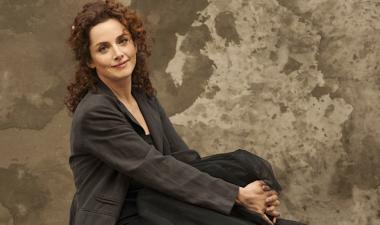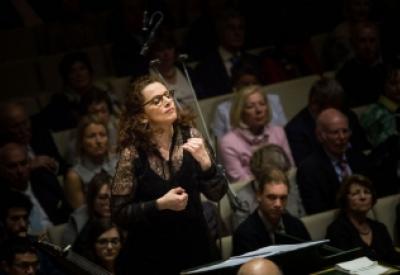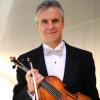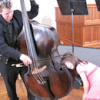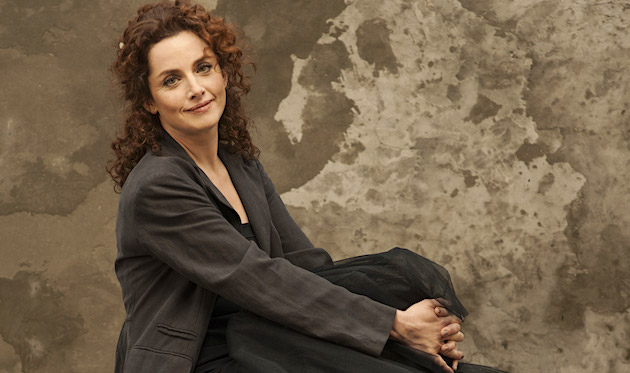
Born in France in 1962, the harpsichordist/conductor Emmanuelle Haïm is at the top of her musical game. Having studied harpsichord with Kenneth Gilbert and Christophe Rousset, Haïm found that her love for voice led her to concentrate on conducting vocal music, first at the Centre de Musique Baroque de Versailles, then at the Paris Conservatory, where she taught from 1990 to 2002.
Artistic director of the orchestra and chorus of the brilliant period instrumental ensemble Le Concert d’Astrée since 2000, the Paris resident is in demand around the world, having rapidly achieved success both with the French Baroque repertoire and with the works of Monteverdi, Purcell, Handel, and Mozart, giving performances at venues from Paris to New York.
Indeed, in 2003 Le Concert d’Astrée was named the best ensemble of the year in the Victoires de la Musique Classique, with The New York Times’ Corinna da Fonseca-Wollheim writing that the group “has become a powerhouse on the early-music scene, bringing its temperamental playing to opera productions, concerts and Grammy-nominated recordings.”
Appearing at festivals both in France and abroad, including at Glyndebourne where she conducted Handel’s Giulio Cesare in 2006 and Monteverdi’s L’incoronazione di Poppea (The Coronation of Poppaea) in 2008, Haïm has also worked with prestigious symphony orchestras such as the Vienna Philharmonic, the Berlin Philharmonic, and the Los Angeles Philharmonic, where the maestra made her debut at Walt Disney Concert Hall in 2011 and can be seen again Jan. 16–17 in a program of Bach, Telemann, and Handel.
I caught up with Haïm, who became Chevalier Légion d’Honneur in 2009, and is Chevalier of the Ordre des Arts et des Lettres, by phone from Paris, where she was happy to chat about her love of the Baroque repertory, being a woman on the podium, and her high regard for the LA Phil, among other topics.
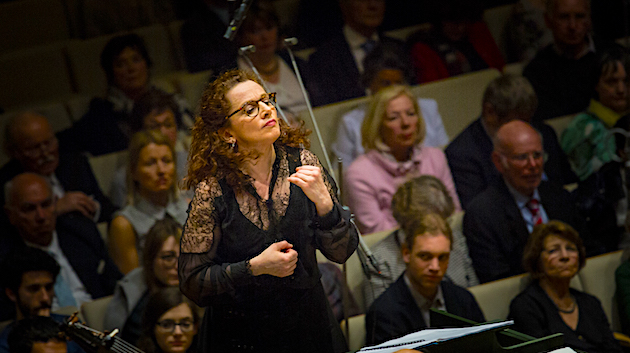
How would you describe your relationship with the Los Angeles Philharmonic, and how do you decide on a program, with this particular one featuring Bach’s Violin Concerto in G Minor, Telemann’s Violin Concerto in A (“The Frogs”) and Handel’s Apollo and Daphne.
I’ve gone through a lot of different music with the orchestra and we have a great relationship. I know the players are very enthusiastic about the repertory we do together and [they] have an appetite and gusto for it, which is very nice. [Their] flexibility and enthusiasm are also very communicative. The choices I make take into account what we’ve played together, what the orchestra plays or doesn’t play. I try to find what would be of interest for the orchestra and secondly the interest for the audience.
In this case, I’ve decided on a main piece for the orchestra, which is Apollo and Daphne, which has a lot of interest to me because, first of all, it’s a great piece. It’s interesting because it’s like a small opera — it tells a story from beginning to end and it’s very narrative. I find that attractive and exciting [because] you can follow the plot. And instrumentally speaking, it’s quite demanding. It has a wonderful solo oboe aria, which is the solo with Daphne singing — when she’s bathing in the fountain, which is very nice when Apollo is pursuing Daphne.
It’s more like a chamber music exchange and so you have to have a real collaboration between the singers and the players. I try also to choose singers that will help us in this way and that the players will enjoy, I hope, as well as the audience. Sandrine Piau is a French soprano that specializes in Baroque music that she has sung for a very long time and the young baritone Jarrett Ott has a wonderful voice who can sustain this in an incredibly imitative way.
Martin [Chalifour], who is the concertmaster — we’ve been collaborating for all of my concerts since the beginning. He had a strong desire of playing some concertos, so we chose to do two violin concertos of the same period as Handel, so the G Minor Concerto from Bach and Telemann — “The Frogs,” which I like and I know what I’m talking about because that’s a French person talking to you. It’s a very interesting piece because he paints nature or atmosphere and in this precise case, the croaking of the frogs. I would say that it’s quite unusual and amusing.
What are the challenges in bringing the aesthetics of the early 18th century to an orchestra like the LA Phil and will you be leading from the harpsichord?
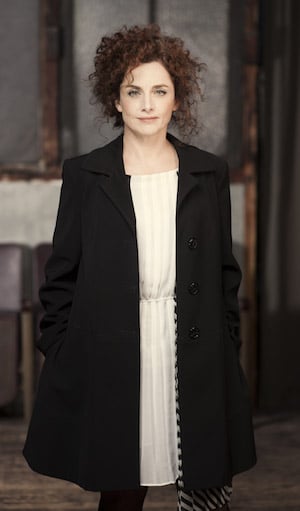
Yes, I will, as Handel did so at the time and if he did so, then the way to do it has to be close to the way he did it. If not, I’m sure it’s the wrong idea of the music. [As for] the repertory I choose, they are things that are still possible and the barriers are less strong than one thinks, less big than one thinks. Music has a universal quality when it’s good music and so I think the point for me is just to show the orchestra a piece of music that maybe they wouldn’t have the opportunity to do and to show that it’s beautiful and to share that beauty together.
I’m amazed what is asked for a player in a symphonic orchestra — how much music they cover. It’s a lot of repertory and they have to have incredible flexibility and the capacity to perform it. What I ask of them is incredible. I have people in my orchestra [Le Concert d’Astrée] that specialize and who almost only play 17th-century music or who specialize in ornamentation at the beginning in Italy. To get to that point of knowledge needs that kind of specialization, of course.
But bridges are still possible and still enrich one’s mind and one’s playing and one’s imagination. For me, it’s also interesting to be meeting great orchestras such as the LA Phil. It’s still very exciting to meet their point of view and their way of seeing things. They also bring me a lot by their experience as an orchestra, because when I started conducting — now it’s 20 years ago — I conducted both modern and Baroque and period instruments.
That was the first time I was playing with modern players, because I was only completely in my field. The ways of seeing things, of doing things, are completely different and oblige me to think more — to think about this communication between our different worlds. I also meet a lot of great musicians, which I find good. That’s the point — that’s what put us together.
How have audiences changed since you began your career? Are younger people becoming interested in early music?
Yes! With my orchestra we have also workshops in some colleges in the north of France where we work intensely with young ones. It’s a battle that I absolutely want to have — that this is not music for an elite audience. This is music that some people might think that it’s very specialized or they might think it’s not alive or could be boring, contrary to Romantic music, but I think it’s expressive, passionate, and it’s engaged and I think it can talk to a lot of people. I was quite struck by the project we did in Aix-En-Provence [in 2016] with the Polish director, Krzysztof Warlikowski, The Triumph of Time and Disillusionment, by Handel.
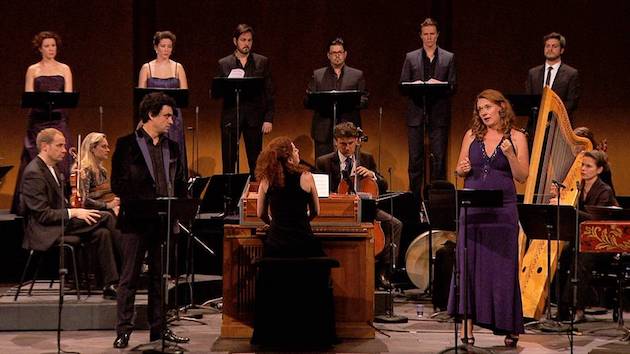
That piece looks like a rhetorical discussion about the vanity we pursue in life about beauty and the end of that piece is about eternal beauty — not the one you have on earth. It doesn’t seem at all like something for a young person, but in the end, the production [dealt with] the destiny of very young people — some losing their life to drugs. [Warlikowski] made it something modern and talking to teenagers to today.
It was so incredible the exchange — a lot because of the staging but also because of the music. It’s something I try to do — to work on the kind of universality of this music and therefore, young or not young audience, it doesn’t matter. When you interest people, when you tell them to look or listen, people who are not specialized in this — they taste it and they enjoy it.
What makes for good chemistry between a conductor and an orchestra?
That’s more to be asked to the orchestra, itself. I don’t know. But first of all, this orchestra, the LA Phil, is such a happy orchestra and you can feel that when you come. The atmosphere is great and very simple and engaging and the musicians are [also] engaged in what they do. You come in a very confident way. From the first day I felt very much at ease with the orchestra who has also a sound, a level of playing that’s incredible. You can feel their versatility — and all the conductors they work with — the diversity of what they do, you can feel it in their sound.
You became the first woman to conduct at the Lyric Opera of Chicago with Handel’s Giulio Cesare in 2007. Today there are decidedly more women on the podium, but when you began, did you find that being a woman was a problem and how have things changed?
It was not a question for me at all at that time. I was very surprised that people were so much talking about it around me. I don’t think any of that was conscious. I started late to conduct somehow — it was something that I was thinking of when I was 8 or 9 — so I could have started much sooner. Maybe the fact of being a woman stopped me a bit, but none of that was conscious.
I did a lot of other stuff before — playing and studying, organ, harpsichord, teaching — a lot of that until it became absolutely clear and obvious to me when I did it and I didn’t consider that question at all. Now, 20 years after, I would say that my temperament doesn’t want to consider that. You have to do something well, so just do it!
I see more and more are doing it with talent, and surely, it’s a question, but not only for us, but as a question that a lot of jobs were more for men. But our society is changing. Our ways of living, our ways of thinking of the family and therefore sharing careers, how do we think about them? All that is changing and that affects women, but it’s not something that was conscious for me. If any difficulties were there, I erased them mentally. I didn’t want to take them in account.
What advice do you have for aspiring conductors?
Follow your path when you are convinced, to just do it, whatever it is. If it is difficult, you’ll find a way. If one door is closed, you’ll go through the other door, or by the window. You have to strongly believe in it — and for anything you do. You have to strongly find in yourself what you need and do it and feel it when you are ready. I think one secretly knows that — for whatever you do.

